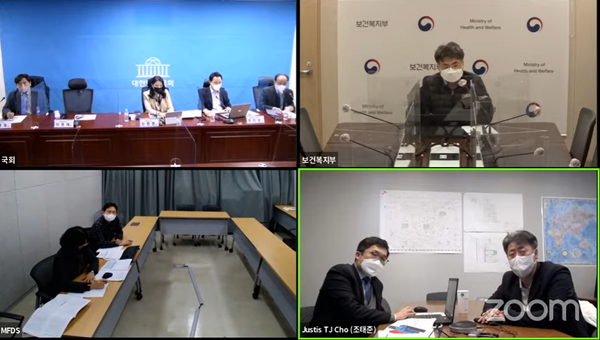Korean vaccine developers are racing to develop a vaccine against the Omicron variant, which is likely to be the dominant variant within a few months in the nation.
Rep. Lee Kwang-jae and Shin Hyun-young of the Democratic Party held a meeting with officials from local vaccine developers on Wednesday to share the industry’s latest plans to develop Omicron-targeting Covid-19 vaccines.

SK Bioscience, Cellid, Eyegene, EuBiologics, and GeneOne Life Science work on Covid-19 vaccines, specifically fighting the Omicron variant.
SK Bioscience said it planned to use the platform of the investigational Covid-19 vaccine GBP510, being tested in a phase 3 study, to make a “universal vaccine” to prevent the infection from both Covid-19 and its variants.
The company began developing an arbovirus-targeting vaccine with $50 million support from the Coalition for Epidemic Preparedness Innovations (CEPI). Earlier, SK Bioscience received the CEPI’s $210 million aid for GBP510 development. In total, the company will get $260 million in funds from the CEPI for Covid-19 vaccine development.
The Sarbecovirus family includes SARS, Covid-19 (SARS-Cov2), and Covid-19 variants.
In other words, SK Bioscience aims to develop a vaccine effective against infections from the sarbecovirus family and their variants altogether.
“We will actively take advantage of the CEPI’s research support and cooperation with outside institutions to push for this plan,” said Cho Tae-jun, executive vice president of the R&D Strategy and Planning Office at SK Bioscience.
According to Cho, the company conducts gene synthesis and produces and cultures cell lines for each variant. “We will develop a vaccine to deal with variants and work on a sarbecovirus vaccine simultaneously.”
‘Support needed for mass production of Omicron vaccine’
Cellid and GeneOne Life Science are developing a two-dose vaccine to protect against the Omicron variant.
Having a variant vaccine evaluation system using 19 kinds of pseudoviruses, Cellid plans to apply for a clinical trial of a vaccine candidate in late February or early March next year after evaluating the effectiveness.
Cellid CEO Kang Chang-yul said the recent establishment of the GMP factory in Seongnam, Gyeonggi Province, will accelerate the company’s clinical trial.
“It is important for a small company to conduct a study, but it is also important to mass-produce the vaccine and supply it for the public,” Kang said, requesting government support to help the company build a vaccine mass production system.
GeneOne Life Science also deems it possible to fight Omicron with GLS-5310, a Covid-19 DNA vaccine tested in a phase 2 study.
The company confirmed that GLS-5310 eliminated the Beta variant, identified first in South Africa, in a test on hamsters in October. Jeong Moon-sup, director of the R&D center at GeneOne Life Science, said Omicron’s spike antigen site was similar to the Beta variant.
‘Government should help get comparative vaccine’
Eyegene and EuBiologics are developing a booster shot to curb the Omicron spread.
Judging that experimental Covid-19 vaccine EG-COVID is effective against Omicron, Eyegene recently started developing a booster shot jointly with AI-backed drug developer PharmCADD.
Eyegene will conduct a phase 1 study of the booster shot in Australians who have completed the second dose of a Covid-19 vaccine from January next year.
The company said it would start a phase 1/2a study in Australia and South Africa in March.
EuBiologics, which applied for a local phase 3 study of synthetic antigen vaccine EuCorVac-19, also tested if the vaccine was potent against Omicron.
EuBiologics CEO Baek Young-ok said EuCorVac-19 demonstrated the neutralizing antibody titer against Omicron in a study that used serum from patients who recovered from Covid-19, giving a positive outlook.
Asked what kind of support EuBiologics will need to win approval for a clinical trial, Baek said securing a comparative vaccine.
Securing a licensed vaccine is essential because it can be compared with an investigational vaccine in a comparative immunogenicity study.
A comparative vaccine study takes less money and time than a placebo-controlled trial. The Covid-19 vaccination rate is high in Korea, so a comparative immunogenicity study is easier to recruit participants.
“To check the effect of boosting or responding to the variant, and to compare it with an existing vaccine, we need a comparative vaccine under the support of the government,” Baek said.

